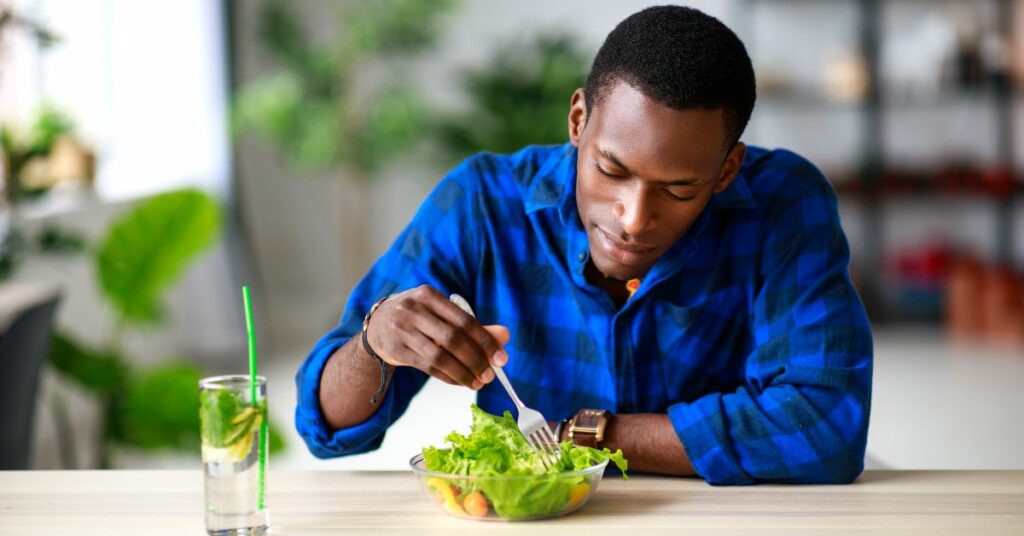Maintaining a diet is about as difficult as completing Navy SEAL training.
Every year, Americans pursue diet plans to lose weight, improve health or regain that six-pack only to fail spectacularly. About 80% of people who shed a significant portion of their body fat will not maintain that weight loss in 12 months, says the Scientific American.
Yet, those who pursue diets for better health can ill afford to fail. This is especially true for many African-American adults, who are more prone to conditions such as obesity, diabetes, heart disease and stroke. Failure could have disastrous consequences.
That’s why Florida A&M University nutrition professor Jenelle Robinson advises that we forego diets for lasting solutions that best fit our lives.
“You need to get away from the word, ‘I’m on a diet’ and say, ‘this is my dietary lifestyle’,” said Robinson.
“My dietary lifestyle is x, y or z and live that way.”

In a recent interview with Black Men’s Health, Robinson offered recommendations for people who want to achieve sustained success with health and nutrition without following trendy diets.
She says that, no matter your environment, you can achieve better nutrition, even if you live in a “food desert” with limited access to healthy food.
“The goal is to make the healthiest decision you can with what you have access to,” she said.
To learn more about how you can adopt and sustain a dietary lifestyle, tap into this vital virtual discussion titled, “The State of Black Nutrition with Dr. Jenelle Robinson,” below:
Introduction
0:40 – Introduction of our guest, Dr. Jenelle Robinson, a scholar, educator and artist, who is a nutrition professor at Florida A&M University.
2:13 – Dr. Robinson talks about the best meal she’s ever had.
3:47 – As a poet and performer, she shares how Hip-Hop influenced her to write poetry.
Her Childhood and Community
7:13 – Dr. Robinson on the community that raised her.
10:57 – She talks about having food and body image issues growing up.
12:08 – How being teased and bullied by family and friends caused her to stop eating.
How She Became a Health and Nutrition Professor
15:46 – Dr. Robinson on how her interest in health and nutrition blossomed into a full-fledged academic pursuit in college.
17:27 – How she ended up becoming a nutrition professor at Florida A&M University.
Black Nutrition: Her Views on The State of African-American Health
23:10 – The state of Black nutrition and health, according to Dr. Robinson.
24:03 – Her advice for what we can do to better our health.
26:51 – Dr. Robinson on what we can do to control or limit environmental factors that impact access to healthy food.
34:07 – Why going vegan may not be the answer.
Black Nutrition, Diet and Food Trauma
39:35 – Dr. Robinson on the cold reality Black people face from family and friends when changing their food habits.
45:55 – Nutritional deficiencies she’s observed in Black people and the nutrients we need.
49:33 – Dr. Robinson offers her thoughts on the Mediterranean diet and why you should opt for a “dietary lifestyle” over “diet.”
56:08 – She shares advice for people who have trauma issues around food.
59:45 – How to connect to Dr. Robinson for information and resources.
Dr. “Jenelle Nicole” (Robinson) is a scholar, educator, and artist. She is an advocate for improving the health of communities of color. Dr. Jenelle has committed to teaching, research, and service projects that promote experiential learning, leadership, and the utilization of the performing arts in health and nutrition education pedagogy to reach underserved ethnic communities. She possesses a PhD in Nutrition, an M.A. in Dietetics, a B.S. in Health Education, and certifications in health education and life coaching. As a nutrition professor at one of the top 10 HBCUs in the nation, Dr. Jenelle combines her unique poetic artistic words with a captivating delivery to reach hundreds of thousands.












